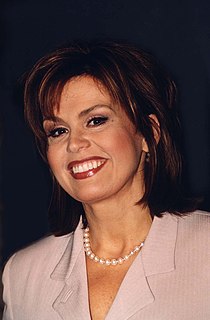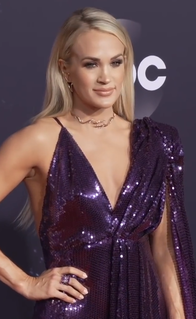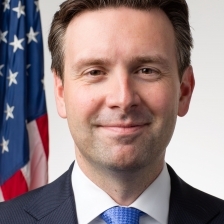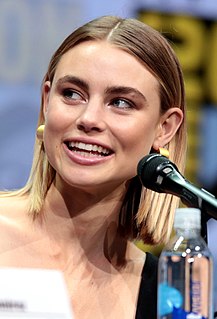A Quote by Marie Osmond
I was so honored when Diane Sawyer named me "Person of the Week," and like I told her, "Diane, I love my daughter." I cried when I found out when she told me she was gay when she was 17 because of the judgment.
Related Quotes
I get goose-bumps when you talk about Diane Wilson. Who knows where she found that courage? When she was a child, she would crawl under the bed when a stranger came to the house. But in 1989, she found out that her county in south Texas was ranked worst in the country for toxic waste. She wondered if the effluent, dumped into the waters where she and her family had shrimped for generations, might be responsible for the dwindling fish populations. And she suspected that her son's autism might be related to the pollution.
She asked me what was wrong, and I told her I had to end it. She was surprised, and asked my why I thought so. I told her it wasn't a thought, more a feeling, like I couldn't breathe and knew I had to get some air. It was a survival instinct, I told her. She said it was time for dinner. Then she sat me down and told me not to worry. She said moments like this were like waking up in the middle of the night: You're scared, your'e disoriented, and you're completely convinced you're right. But then you stay awake a little longer and you realize things aren't as fearful as they seem.
I met [Gilda Radner] on the first night of filming ... Hanky Panky that Sidney Poitier was directing. And it's funny, I was in costume and makeup - my tuxedo and makeup because I'd done a few shots before she arrived, and she told me later that she cried all the way in, in the car, because she knew that she was going to fall in love with me and want to get married.
My mom's younger sister was born with Down syndrome. I was close to my grandmother when I was growing up. I remember talking to my grandmother about politics, and she told me that she regularly voted for the Democrats because she knew that they were going to look out for people like her daughter. That made an impression on me, too.
I love Elizabeth Taylor. I'm inspired by her bravery. She has been through so much and she is a survivor. That lady has been through a lot and she's walked out of it on two feet. I identify with her very strongly because of our experiences as child stars. When we first started talking on the phone, she told me she felt as if she had known me for years. I felt the same way.
Oh, Diane Nash deserves her own film. Diane Nash is a freedom fighter who is still alive and kicking. She was one of the leaders of the desegregation of Nashville, basically. She was a student at Fisk University who was one of the founding members of SNCC, the Student Nonviolent Coordinating Committee.
However, every word she [Richelle Mead] wrote about Lissa in the book I highlighted and analyzed and interpreted until I felt like I’d completely absorbed her [Lissa]. So Richelle gave me insights through the pages of the book. I cried when I found out that she told the producers that I was her dream Lissa. It meant the world to me.
I shall never get out of this! There are two of me now: This new absolutely white person and the old yellow one, And the white person is certainly the superior one. She doesn't need food, she is one of the real saints. At the beginning I hated her, she had no personality- She lay in bed with me like a dead body And I was scared, because she was shaped just the way I was only much whiter and unbreakable and with no complaints. I couldn't sleep for a week she was so cold.
There was one person who greatly and directly benefited my career--my agent Virginia Kidd. From 1968 to the late nineties she represented all my work, in every field except poetry. I could send her an utterly indescribable story, and she'd sell it to Playboy or the Harvard Law Review or Weird Tales or The New Yorker--she knew where to take it. She never told me what to write or not write, she never told me, That won't sell, and she never meddled with my prose.


































